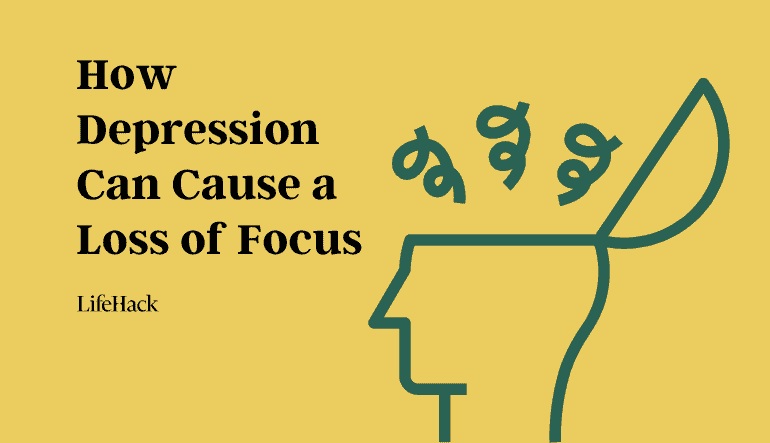
Globally, an estimated 5% of adults are grappling with depression. It’s more than a statistic; it’s a reality for many, and it’s closer to home than most of us might think.
Now, when you hear about depression, you might think about profound sadness or despair. But what you might overlook is how it’s tied to something as seemingly mundane as the inability to focus.
An inability to focus might not appear on the surface as one of the symptoms of depression. Yet, the two are more interconnected than they seem.
The fact is, depression exists on a spectrum. It’s not just the extreme cases where someone can’t get out of bed. It’s not black and white. Often, people with depression are still able to do the daily tasks that life demands of them. They go to work, they cook meals, but they’re not at their best. They feel awful, but they manage. And this is where the connection with focus comes in.
During a depressive episode, a person doesn’t merely feel sad or irritable; they feel a loss of pleasure or interest in their usual activities. It’s not a fleeting mood; it’s something that sticks around, lasting most of the day, nearly every day, for at least two weeks. This lingering dark cloud can often lead to other symptoms like poor concentration and a feeling of exhaustion. In this way, the ability to stay focused is indeed closely intertwined with depression.
It’s a topic worth exploring, a connection worth understanding. Because recognizing these nuances in how depression manifests can lead to better support, empathy, and treatment. Understanding is the first step to healing.
How Depression Affects Your Ability to Focus
It’s not just a feeling, it’s not just a mood, it’s a change in how your brain functions. When we talk about depression, we’re talking about an actual alteration in the way our cognitive machinery works.
Natascha Santos, PsyD, a psychologist and behavior therapist, has put it rather succinctly:
“Research has suggested that processing speed — the ability to take in information quickly and efficiently — is impaired in individuals who are depressed.”
This isn’t a vague statement; it’s backed by data.
Let’s look at a study with 448 participants, mostly students. It wasn’t just about feeling down or blue. It uncovered actual cognitive changes, tangible shifts in how the mind operates. We’re talking about challenges in areas like memory, inhibition control, planning, and flexibility. Imagine trying to navigate your day, your work, or your studies with these roadblocks in place.
And this isn’t an isolated finding. Another study involving 1,123 college undergraduates found similar results. Their depressed mood was more than just a temporary hindrance; it actually interfered with their ability to maintain task goals and led to deficits in executive function.
So, what does this all mean? It means that depression isn’t just an emotional state; it’s a cognitive state. It’s a disruption in the very fabric of how your brain processes and responds to information.
We’re not just talking about feelings; we’re talking about fundamental brain function. And that’s a conversation worth having.
Depression & Loss of Concentration: The Vicious Cycle
The relationship between depression and concentration isn’t a one-way street. It’s a loop, and unfortunately, it’s a negative one. Loss of concentration isn’t just a symptom of depression; it’s also a contributor. That means that when you lose focus due to depression, it can make the depression itself worse. It’s a cycle, and like many cycles, it can be hard to break.
What makes this cycle particularly insidious is how it begins. To focus on something, you have to want to reach a goal that you believe is worth achieving. But depression interferes with that motivation. The things you once loved, the activities that once sparked joy or interest, they start to lose their shine. You begin to feel hopeless, you lose interest, and so, why concentrate on them?
And here’s where the loop tightens its grip. This very depression, the thing that’s causing the loss of focus, also makes it harder to concentrate because you simply don’t see the point. The more you lose focus due to depression, the harder and more pointless it all seems. It’s a bit like trying to see clearly through a fog. You strain your eyes, but the more you try, the more difficult and pointless it all seems.
So, you get stuck in this loop. You’re depressed, so you lose focus. You lose focus, so you get more depressed. Around and around it goes, each turn making the next one seem more inevitable.
Understanding this loop isn’t just an intellectual exercise. It’s a way to start unraveling the complexities of depression. By recognizing how loss of concentration and depression feed off each other, we may find ways to intervene and break this negative cycle.
How to Refocus When You’re Depressed
Depression is hard, there’s no way around that. It’s a challenge that many people face, and it often leads to being excessively hard on oneself. This self-criticism can deepen the depression, making a difficult situation even worse. But what if we could break that cycle? What if we could find ways to be gentle with ourselves, to recognize our accomplishments even when they feel like “not enough”?
First, it’s important to understand that depression isn’t your fault. It literally changes your brain, and understanding this can provide a new perspective.
You’re not failing to concentrate because of weakness or lack of willpower. It’s something happening in your brain, and there’s no shame in that. In fact, knowing this might be the first step towards feeling proud of all that you are still accomplishing, despite the depression.
And here I’ve some practical tips to help you refocus when you feel depressed:
1. Delegate Responsibilities
If there are tasks that can be done by others, delegate them. Let family members or colleagues help. It can free up your focus for the tasks only you can do.
2. Break Down Tasks
Sometimes, the big picture can be overwhelming. Break each task into smaller sub-tasks. It makes them more manageable.
3. Start with Small Successes
Tackle a small task first thing in the day. Completing it will give you a sense of accomplishment and can set a positive tone for the rest of your day.
4. Focus on Sleep
Depression often interferes with sleep, and lack of sleep makes concentration harder. Work on a good sleep routine to give your brain the rest it needs.
5. Take Regular Breaks
Take breaks regularly throughout the day. Do something relaxing and enjoyable. For example, breathe in a favorite scent, take a walk, or practice mindfulness.
6. Know When to Seek Professional Help
Sometimes, it’s more than we can handle alone. Therapists and counseling professionals are there for this very reason.
Being gentle with yourself is not just a nice idea; it’s a vital practice. It recognizes the reality of depression and provides practical strategies to navigate it. These tips are not about fighting through or pushing past depression. They are about working with where you are and finding ways to move forward, even in small steps.
Final Thoughts
Depression might be a part of your life, but it doesn’t have to control you. There’s help, there’s hope, and there’s a path forward. It starts with understanding and kindness, both towards yourself and from those around you.
With the right techniques and help, you can also take control of your focus and achieve what you want.







